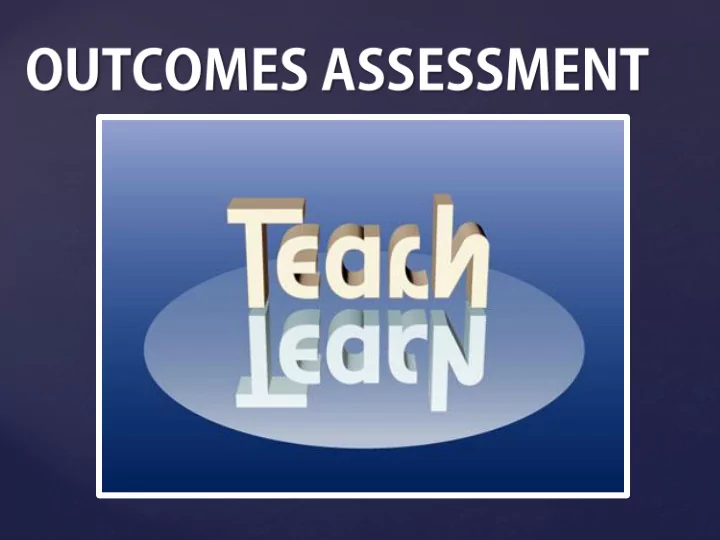

{
We are at the end of our first cycle of Learning Outcomes Assessment
What has COA learned: We’ve learned that Learning Assessment is not going away. We’ve learned that Learning Assessment can provide valuable information. We’ve learned that Learning Assessment at Mesa covers a wide spectrum of styles providing a variety of results. We’ve learned that we need to make changes to our processes and procedures to make Learning Assessment a more successful tool.
The Snapshot Report Where are we currently : { A year ago { Now 84.5% 75.5% of all outcomes of all outcomes assigned to assigned to courses have been courses have assessed been assessed
What’s Next? What will the next { cycle of Learning Outcomes Assessment look like?
COA was charged with revision of the ILO’s and working definitions. This Fall, in examining the Mesa ILOs we found: our ILOs were duplicative many had common themes research from other institutions and work done by the LATF helpful in rewriting the Mesa ILOs in an effort to clarify and simply it was possible to weave the ACCJC Degree Graduate Competencies more thoroughly throughout the ILOs The result was the creation of four ILOs: Ethical Citizenry Communication Critical Thinking Information Competency
Ethical citizenry Understand and demonstrate personal, civic, social, and environmental responsibility and cooperation in order to become a productive local and global citizen Practice respectful interpersonal and intercultural communication Evaluate personal knowledge, skills, and abilities and set educational and career goals
Communication Demonstrate effective communication and comprehension skills as appropriate to content Comprehend, analyze, and respond creatively to oral, written, and visual information Effectively communicate through speaking, writing, illustrating, and other modes of expression appropriate to the context Communicate awareness of how culture and ethnicity shape and impact individual experiences and society as a whole
Critical thinking Collect, analyze, evaluate, and synthesize relevant information from multiple perspectives and diverse sources, distinguishing facts from opinions and biases Employ appropriate computational skills as part of the problem-solving process Apply appropriate problem solving methods making connections across disciplines, and create a plan of action to resolve the issue Draw reasonable conclusions based on evidence in order to make decisions Monitor progress, construct and deconstruct arguments, and adjust the plan as appropriate to evaluate the consequences of these solutions
Information competency Gather and analyze information using technology, library resources, and other modalities Understand and act ethically with respect to computer technology and information acquisition and distribution; distinguish between credible and non-credible sources of information, and use the former in an appropriately documented fashion Develop personal awareness of how one learns information, such as self-awareness, self-reflection, cultural sensitivity, and personal growth Develop academic strategies that support success, such as effective note-taking and test-taking strategies Demonstrate life-long learning skills to acquire and employ new knowledge
ACCJC Degree Graduate Competencies and Mesa ILO/GELO Revised Mesa ILO General Education Curriculum Communication competency Communication Communication Self Awareness and Interpersonal Skills Critical Thinking Technological Awareness Information Competency Information competency Critical Thinking Communication Communication Critical Thinking Technological Awareness Information Competency Quantitative competency Critical Thinking Critical Thinking Technological Awareness Information Competency Analytic inquiry skills Critical Thinking Critical Thinking Technological Awareness Information Competency Ethical reasoning Personal Awareness and Civic Responsibility Critical Thinking Ethical Citizenry Ability to engage diverse perspectives Global Awareness Communication Self Awareness and Interpersonal Skills Critical Thinking Ethical Citizenry Responsible participation in civil society Communication Critical Thinking Ethical Citizenry Skills for lifelong learning and application of Communication learning Critical Thinking Ethical Citizenry Information Competency Broad comprehension of the development Communication of knowledge, practice, and interpretive Critical Thinking approaches in the arts and humanities, the Ethical Citizenry sciences, mathematics, and social sciences Information Competency
Break-out Session { We want your input on the revised ILOs and Operating Definitions
Ethical citizenry Communication Understand and demonstrate personal, civic, social, and Demonstrate effective communication and comprehension skills environmental responsibility and cooperation in order to as appropriate to content become a productive local and global citizen Comprehend, analyze, and respond creatively to oral, written, Practice respectful interpersonal and intercultural and visual information communication Effectively communicate through speaking, writing, illustrating, Evaluate personal knowledge, skills, and abilities and set and other modes of expression appropriate to the context educational and career goals Communicate awareness of how culture and ethnicity shape and impact individual experiences and society as a whole Critical thinking Information competency Collect, analyze, evaluate, and synthesize relevant information Gather and analyze information using technology, library from multiple perspectives and diverse sources, distinguishing resources, and other modalities facts from opinions and biases Understand and act ethically with respect to computer Employ appropriate computational skills as part of the problem- technology and information acquisition and distribution; solving process distinguish between credible and non-credible sources of information, and use the former in an appropriately Apply appropriate problem solving methods making documented fashion connections across disciplines, and create a plan of action to resolve the issue Develop personal awareness of how one learns information, such as self-awareness, self-reflection, cultural sensitivity, and Draw reasonable conclusions based on evidence in order to personal growth make decisions Develop academic strategies that support success, such as Monitor progress, construct and deconstruct arguments, and effective note-taking and test-taking strategies adjust the plan as appropriate to evaluate the consequences of these solutions Demonstrate life-long learning skills to acquire and employ new knowledge
COA sponsored Workshops for Spring Assessment 101 — what defines authentic assessment, and how to utilize the data derived from your assessment. February 19, 2016 from 11-1 PM, Room TBA Bri Hays and Kris Clark Best Practices for Outcomes-based Assessment Colleague’s will present successful Outcome’s Assessment Practices. April 2016 COA is evaluating our data collection system (TaskStream) and looking at potential alternatives. Look for more details this semester. COA is refining the process for Assessment for the new cycle; defining new parameters and creating a handbook to guide faculty , staff, and administrators in the process of Outcomes Assessment.
Recommend
More recommend